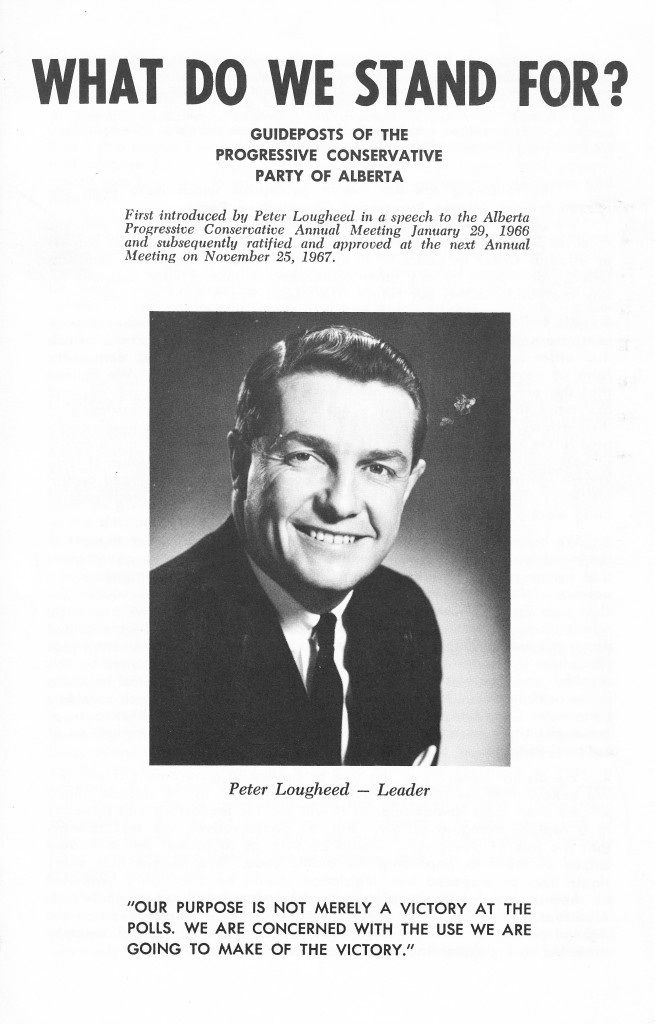Leader’s Address at 1984 PCAA AGM: Part I
Wednesday, January 14, 2015
Categories: Annual General Meeting,History,Lougheed,PCAA,Politics
Excerpts of the Provincial Leader’s Address at PCAA AGM in Calgary on March 31, 1984
I thought I might talk a little bit today about politics. I haven’t had a chance to talk with you since November 2, 1982. What is Politics about? It starts with getting elected, then with meeting your promises and commitments, then doing other things to help people, then it moves to getting re-elected and to sustaining that support.
So let’s talk about our record. We started in 1965 with no seats. The first election of 1967 we won six seats with 26% of the popular vote. In 1971 we won 49 out of 75 seats and 46% of the popular vote. Then we sought a renewed mandate in 1975 and we won 69 out of 75 seats with 62% of the vote. Then in 1979 we increased again our majority to 74 of 79 seats with 57% of the vote. Then in 1982 the most incredible result – unparalleled anywhere – for a government in office seeking its third mandate for re-election – we increased our majority to 75 seats but the real key, we increased the popular vote to 62%. Well done!
What I am trying to say is that it is easy to talk about what you will do. What counts is what you do when you have the responsibility. When you get into the kitchen, can you take the heat? Can you make the tough decisions? Can you maintain your balance? Talk comes fairly easy. It is action that counts. The test of performance is to sustain that support and that confidence. So, what I want to talk about today are four basic questions.
First of all, how did we as the Party get where we are? Secondly, where did we as a province come from? Third, where are we at now in the Spring of 1984 as a Party and a province? Last, where are we going as a province and a Party?
Well, how did we get here? As I said, it was from scratch. I think it is important, therefore, to discuss why and how.
There are some key fundamentals. It is important to remember what they are. Dear friends, we ignore these fundamentals at our peril. We started, as I say, with nothing, without seats, money or organization. We had no IOU’s and we still have no IOU’s. We have moved ahead with a solid foundation. What are the fundamentals? Let me go over them as I sense them – have you think about them and then raise them with me tomorrow if you wish.
The first fundamental of the Provincial Progressive Conservative Party is that it be an open democratic Party in the fullest sense of the word. Open in its nominating meetings, open in its request for people to come and join – continually inviting new people to come in. Never closing the door. That in itself is very meaningful. If we had ever taken the position that you have to show some credentials or some Conservative background or something, to come and be part of this Party, we would still be meeting down in the basement. We invited people to come in from other Parties. We invited them to come in and be a part of our team. If they had never been involved in the political process before there was a special invitation. That was important. So, that is the first fundamental. An open, democratic Party.
The second fundamental is really important. We started out with a strategy. I guess you would call it strategy but it was more the attitude of the people. We said, let’s not do it the old way. Let’s have politics in which we present ourselves positively as to what we stand for. What we stand for as a Party, what we will do if we are elected. That is the way we started because that is the kind of people we are. If there is one thing that bothers me about politics, it is tearing people down and questioning their motives. I argue with their judgement, I often dispute very much their point of view on issues but I don’t believe in questioning peoples motives. We never have, we never will and let’s keep it that way.
The other fundamental is volunteers. You don’t run a political campaign other than through volunteers. How do you get volunteers? You get volunteers by asking them to come, by making them feel good because we are positive, by having an open Party, but more than that, by listening to them and communicating with them and making their presence really count. So between 1965 and 1971 it was bringing in volunteers to our constituencies, that was key.
